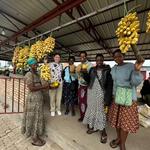Laura Smith, Économie internationale et développement
Pays de stage: Rwanda
ONG canadienne: Centre d'étude et de coopération internationale (CECI)
ONG locale: Save Generations Organization
À mi-parcours de mon mandat à Kigali, au Rwanda, j'ai beaucoup à réfléchir. Mon rôle de responsable de l'autonomisation économique des femmes, en partenariat avec le Centre d'étude et de coopération internationale (CECI), m'a conduite à Save Generations Organization (SGO). Il s'agit d'une organisation rwandaise de développement et de défense des droits des femmes qui se consacre à la préparation, à l'autonomisation et à l'équipement des générations futures tout en défendant les droits des enfants, des jeunes et des femmes.
Déménager au Rwanda a été un acte de foi à bien des égards - ma première fois en Afrique, ma première fois en tant que solitaire, ma première expérience de travail dans une ONG, et bien d'autres choses encore. Aujourd'hui, avec le recul, je peux dire en toute confiance que venir à Kigali a été l'une de mes meilleures décisions. En saisissant cette opportunité, j'ai pu mettre à profit ma formation en économie et contribuer à un contexte local, centré sur la personne, ce qui rend cette expérience vraiment inestimable.
Permettez-moi de vous faire part de mon contexte personnel. Il s'agit de mon dernier semestre de licence avec spécialisation en économie et développement international, et je considère donc cette expérience comme une étape non officielle pour terminer mes études de premier cycle sur une bonne note. Tout au long de mon parcours à l'Université d'Ottawa, j'ai eu le plaisir d'effectuer quatre stages d'éducation coopérative qui m'ont donné l'occasion d'appliquer mes connaissances académiques en dehors de la salle de classe. J'ai extrapolé des tendances et rédigé des résumés mensuels sur les habitudes de dépenses des Canadiens à Statistique Canada, j'ai dépanné des automatisations de processus financiers à Affaires mondiales Canada et j'ai contribué à un audit de performance au Bureau du vérificateur général. Je suis extrêmement reconnaissante pour toutes ces expériences qui ont contribué à enrichir mes compétences et mes connaissances. Cependant, j'étais toujours impatiente d'appliquer mes connaissances et de contribuer au développement et à l'autonomisation des femmes dans un contexte local.
Ma mission de bénévolat est à la fois stimulante et enrichissante. Je suis chargée d'effectuer une évaluation interne du programme d'autonomisation socio-économique des femmes et des filles de SGO. Mon rôle consiste à analyser les forces, les défis, les lacunes et les progrès du programme, puis à rédiger un rapport complet. Ce rapport décrira les leçons apprises et les recommandations qui seront utilisées pour informer les interventions futures et la mobilisation des ressources. Au fur et à mesure que j'avance dans ma mission, j'apprends à connaître le travail de SGO pour renforcer les coopératives de femmes. Chaque jour, je suis inspirée par leur dévouement et leurs efforts inlassables pour élever les femmes et amplifier leur voix.
Ici, à Kigali, dans un environnement de base axé sur un développement centré sur la personne, je me rappelle le rôle transformateur que les économistes peuvent jouer dans l'amélioration des vies et l'élévation des communautés. Cette expérience souligne que le rôle des économistes va bien au-delà du suivi d'indices boursiers comme le Dow Jones. Au-delà des chiffres et des théories, la compréhension de l'économie internationale nous dote d'un ensemble d'outils puissants pour favoriser l'autonomisation. Alors que je me prépare à entreprendre des études supérieures en économie à partir de septembre, j'ai la conviction que l'économie est une force dynamique qui nous permet de comprendre le monde qui nous entoure et qui, associée à une perspective internationale empathique, peut être un catalyseur de changement positif.

